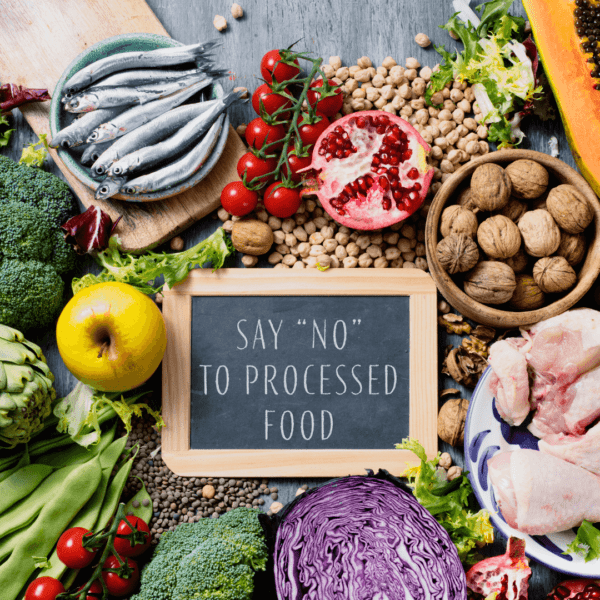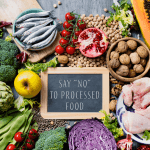
Unravelling the addiction: Why are we hooked on processed foods?
In today’s fast-paced world, processed foods have become a ubiquitous part of our daily lives. From sugary snacks to savoury treats, convenience often triumphs over the quality of our diets. But why are we so addicted to processed foods? In this blog, we will delve into the various factors that contribute to this widespread dependency on foods that are often loaded with preservatives, artificial additives,and an unhealthy amount of sugar, salt and fat.
Palatability and flavour enhancers: Processed foods are designed to be hyper-palatable or what we often describe as “moor-ish”. They are specifically formulated with the perfect combination of salt, sugar, and fat to make them irresistibly tasty. Food scientists work diligently to enhance flavours, making it difficult for our taste buds to resist. This flavour explosion hijacks our brain’s reward system, making us crave more.
Convenience: We are living in a busy world, and because of this, convenience is king. Processed foods require minimal preparation or cooking time and with our daily lives packed to the brim, it’s all too tempting to grab a pre-packaged meal or snack rather than spend time in the kitchen. It is this convenience factor that is contributing to our addiction to foods that offer quick satisfaction.
Advertising and marketing: Food companies invest heavily in advertising and marketing campaigns to make their products appealing. Catchy slogans, enticing imagery, and emotional appeal are often used to create an emotional connection with their audience. These advertisements are designed to make processed foods seem like the answer to our problems, further fueling our addiction.
Price point: Processed foods are often cheaper or perceived to be cheaper than fresh, whole foods. This cost-effectiveness is especially appealing for those on a tight budget. Unfortunately, this cost-saving measure can lead to a cycle of dependency on cheap, unhealthy options.
Cravings and addiction: Processed foods can lead to addictive eating patterns. The high sugar, salt and fat content in many of these products can create cravings and consuming them triggers a temporary feeling of pleasure. Over time, the need for these quick bursts of pleasure can lead to dependency.
Lack of time and cooking skills: Many people find themselves overwhelmed by their daily responsibilities, leaving little time for meal preparation. Additionally, the lack of cooking skills can make the idea of preparing fresh, wholesome meals seem daunting or unattainable. Processed foods become the go-to solution.
Emotional eating: Processed foods can provide comfort during times of stress, sadness, or anxiety. This emotional connection between food and comfort can lead to a reliance on processed comfort foods to cope with life’s challenges.
Availability: Processed foods are readily available and are often placed conveniently at eye level or near checkout counters. The ease of access makes it tempting to grab a bag of chips or a chocolate bar on a whim or on the go.
Long shelf life: Processed foods are designed to have a long shelf life. This means they can be stored for extended periods without spoiling due to chemical additives. For consumers, this can translate to food that lasts longer in the pantry, reducing the frequency of trips to the grocery store.
Peer pressure and social norms: Social gatherings, office lunches, and celebrations often feature processed foods. Peer pressure and the desire to fit in can lead to consumption of these items even when we might prefer a healthier option.
Our addiction to processed food is a complex interplay of factors, from the enticing flavours and convenience to the emotional connections we build around these products. Recognising these influences and understanding the impact they have on our health is the first step towards making better food choices. For better health, it is essential to strike a balance between convenience and nutrition, making informed decisions about what we put into our bodies. Breaking the cycle may take effort, but it is a journey towards improved health and extending tomorrow. So, if you are struggling to break free from the urge to buy that chocolate bar at the service station, or the hot chips and beer at the footy, and would like to break the cycle once and for all, please get in touch as we are here to support you.
References:
Ferretti, F., Mariani, M. & Sarti, E. (2021). Is the development of obesogenic food environments a selfreinforcing process? Evidence from soft drink consumption. Global Health 17, 91 https://doi.org/10.1186/s12992-021-00735-y
Poti, J.M., Braga, B., & Qin, B. (2017). Ultra-processed food intake and obesity: What really matters for health-processing or nutrient content? Current Obesity Reports, 6(4), 420–431. https://doi.org/10.1007/s13679-017-0285-4
Valicente, V. M., Peng, C.-H., Pacheco, K. N., Lin, L., Kielb, E. I., Dawoodani, E., Abdollahi, A., & Mattes, R.D. (2023). Ultraprocessed foods and obesity risk: A critical review of reported mechanisms. Advances in Nutrition (Bethesda, Md.), 14(4), 718–738. https://doi-org/10.1016/j.advnut.2023.04.006










Very interesting details you have noted, thanks for posting.Raise blog range
Visit my webpage :: Kellye G